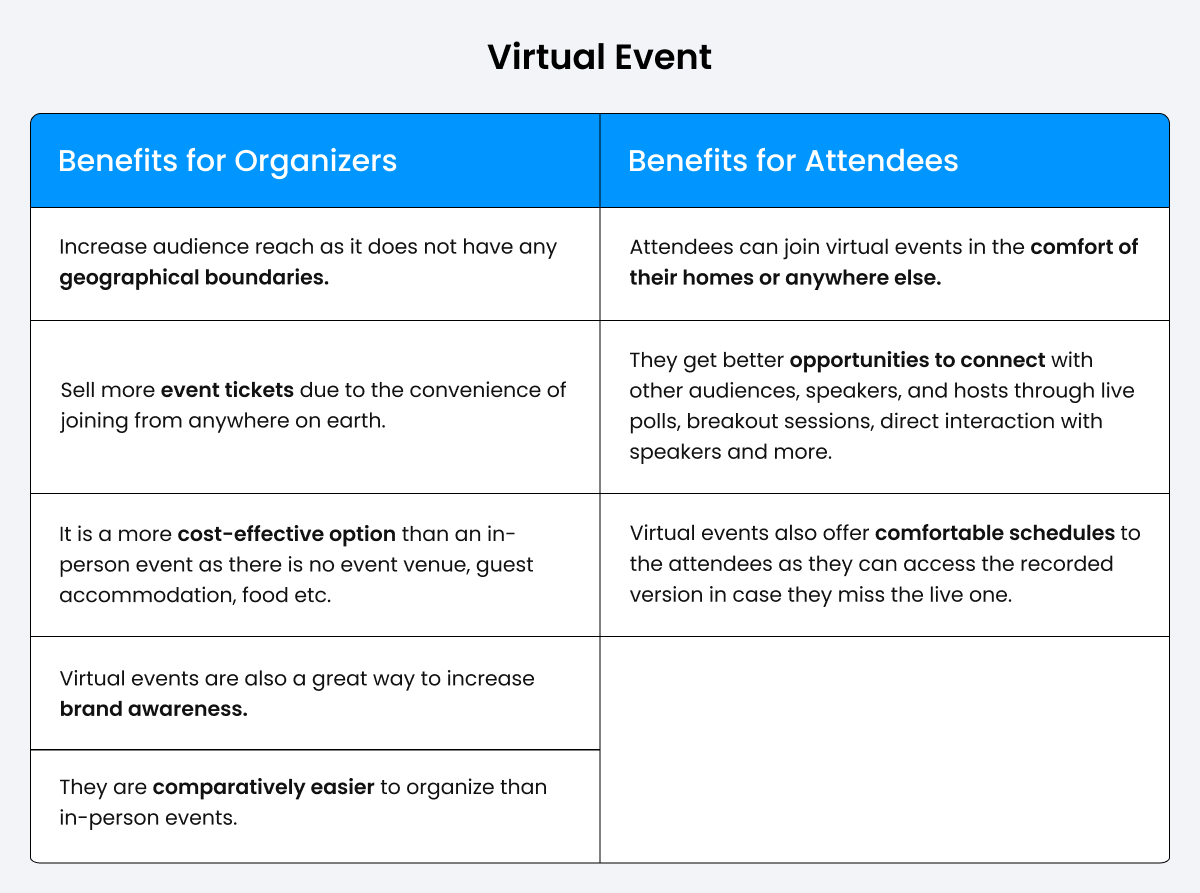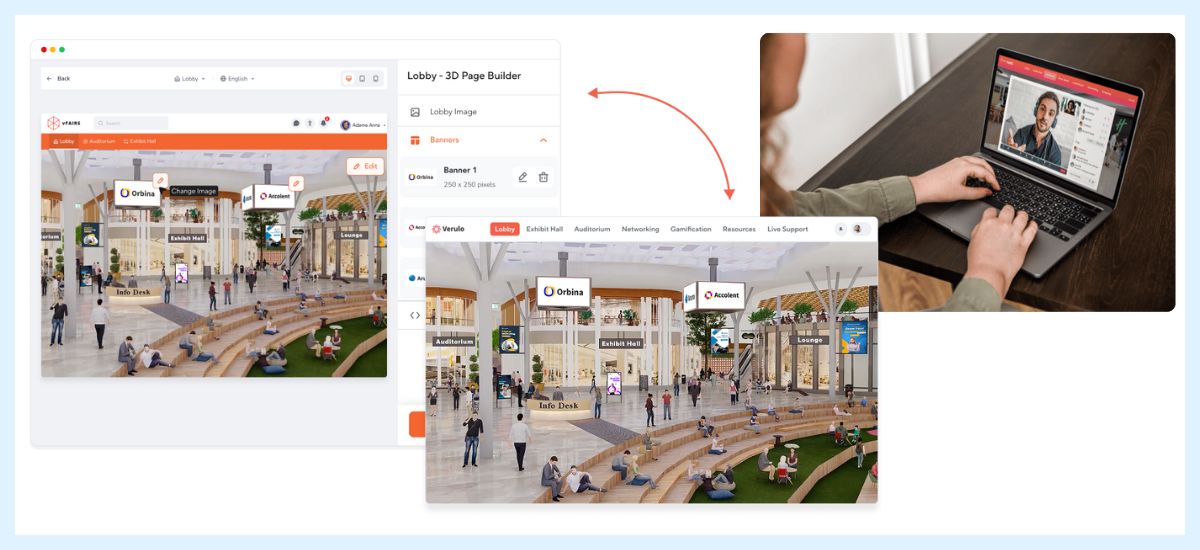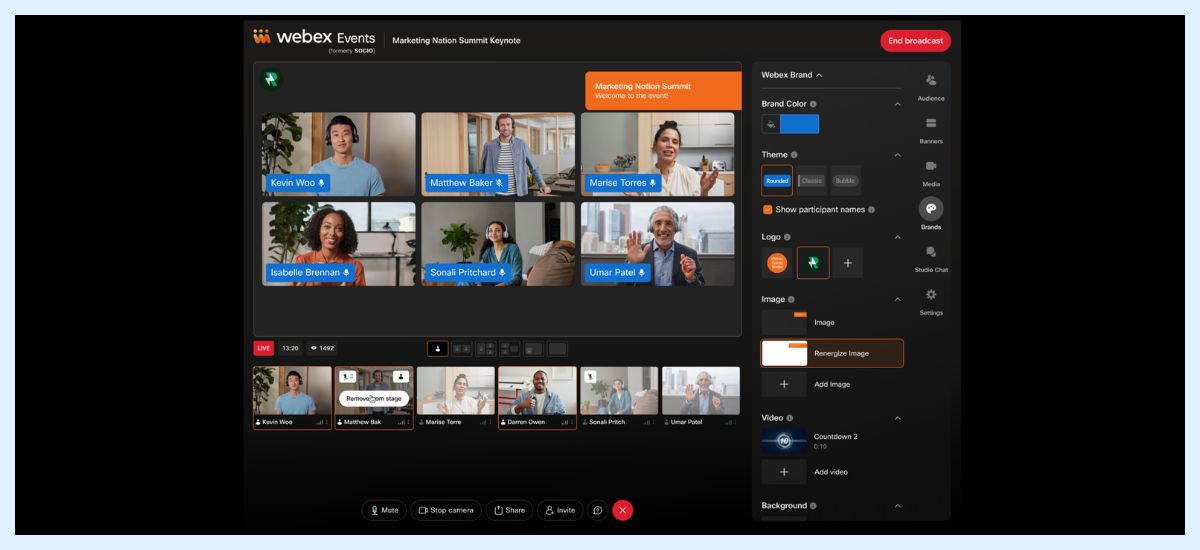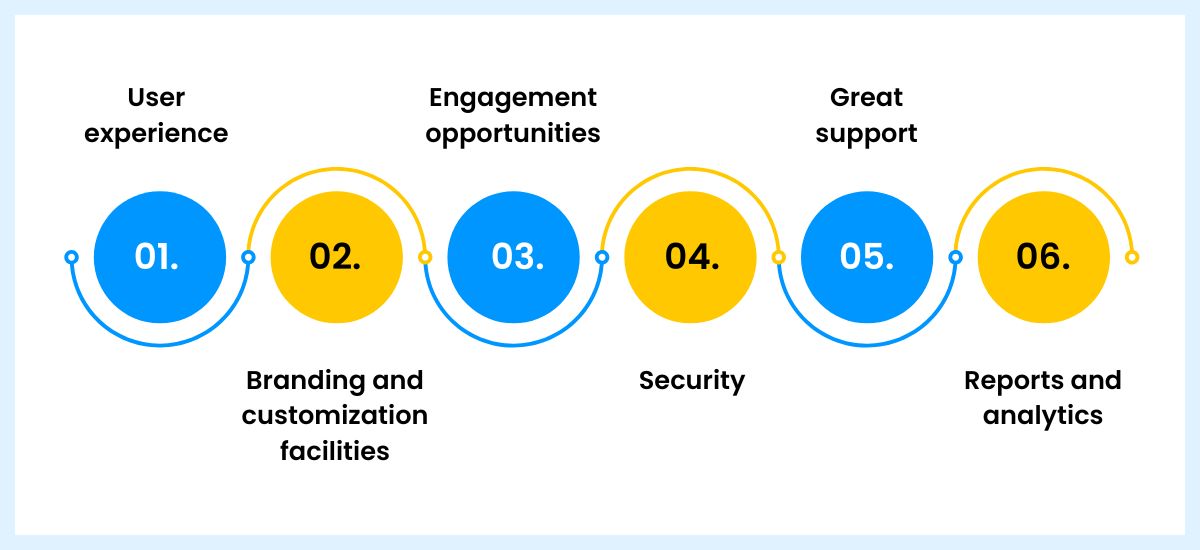-
Events
-
May 16, 2025
-
May 19, 2025
-
105
-
0
- Next blog »
Hosting a virtual event successfully requires the right approach along with technical support. In 2020 when more and more companies were exploring virtual events as the only way to revive their marketing activities, they realized the advantages of it. Though hybrid and in-person events made a comeback in a large scale in 2023, virtual events remained a powerful marketing tool for businesses.
Virtual events are cheaper, easier to host, and often more convenient for attendees to attend.

If you have ever googled on how to host a virtual event, this article is for you as we have covered all the essential details about virtual event planning and some of the best platforms for virtual events.
Let us first make the concept of virtual events easy for you.
What is a Virtual Event?

A virtual event is an event that happens online, and attendees join and interact in a virtual environment. In simple words, attendees in a virtual event, experience the event content online through a high-speed internet connection. Some of the virtual event examples include virtual conferences, meetings, exhibitions, online classes, webinars, etc.
How to Host Virtual Events

There is no rocket science in hosting virtual events. You need the right platform and follow the steps that are essential for the success of such events.
- At first, you need to set your goals for the event whether you want to enhance audience reach, promote your products, build connections or anything else.
- Select the type of virtual event you want to host to fulfill your target like webinars, virtual exhibitions, social gatherings etc.
- The next step is to select a suitable virtual event management platform that offers the right features like live polling, breakout sessions, scope to interact for attendees, etc.
- Create a roadmap in your virtual event planning along with the schedule.
- Contact with the speakers well in advance and discuss things properly.
- Effectively promote your virtual event through email marketing, and social media marketing.
- Test your equipment and keep alternatives to them for any unforeseen emergency.
- Check your audio and visual quality before the event.
- Ensure that you have a high-speed internet connection.
- Engage your audiences through live polls, Q&A sessions, chats, group discussions and more.
- Simplify registration and ticketing for your attendees.
- Conduct a post-event survey for feedback.
- Share your event recordings with the attendees who could not make it on time.
The above-mentioned virtual event planning checklist will help you in your virtual event planning and streamlining the entire process.
Why Host a Virtual Event
Organizing virtual events comes with a number of advantages for both the event organizer and attendees. Let us enlighten you about the same:

Virtual event benefits for organizers:
- Increase audience reach as it does not have any geographical boundaries.
- Sell more event tickets due to the convenience of joining from anywhere on earth.
- It is a more cost-effective option than an in-person event as there is no event venue, guest accommodation, food etc.
- Virtual events are also a great way to increase brand awareness.
- They are comparatively easier to organize than in-person events.
Virtual event benefits for attendees:
- Attendees can join virtual events in the comfort of their homes or anywhere else.
- They get better opportunities to connect with other audiences, speakers, and hosts through live polls, breakout sessions, direct interaction with speakers and more.
- Virtual events also offer comfortable schedules to the attendees as they can access the recorded version in case they miss the live one.
Best Platforms for Hosting Virtual Events
Besides a solid strategy and roadmap, the success of your virtual planning highly depends on the platforms. Discover some of the best virtual events platforms that you must be aware of:
1. Wp Event Manager

Whether it is about virtual event planning or an in-person one, WP Event Manager handles them all with its superior addons and features. It is a feature-packed event management platform that offers more than 37 add-ons for various event management requirements. The virtual event add-ons of WP Event Manager include:
- Zoom
- It offered complete admin control for the management of the entire system.
- WooCommerce integrated.
- 100% security and privacy.
- For paid virtual events, meeting links are only visible to those attendees who have registered for them.
- Waiting room facility for attendees before joining the event.
- Zoom registration system with the registration addon.
- Sync meetings and conferences with Zoom.
- Expo Networking
- Multiple networking opportunities.
- Easy creation of branded booths, breakout sessions, live polls, live sessions, group discussions etc.
- Social lounge to help organizers add multiple tables.
- Raise hand emoji for participants to join a conversations.
- Private backstage for making any last minute changes or preparation.
- Speakers and Schedule
- It allows you to split your events into multiple sessions.
- Manage your sessions and speaker details through detailed dashboards.
- Improve communication with attendees by letting them know about the speakers, their details, and the schedule in your events.

It offers a combined strength of Zoom and WP Event Manager that is mainly suitable for virtual meetings, conferences, classes, seminars etc. Its key features are:

Expo networking is another masterpiece of WP Event Manager that is especially designed for virtual exhibitions. It has features that perfectly replicate the convenience of an in-person event.
Here are the key features:

The speakers and schedule addon is to help event organizers add and display the details of the speakers and their specific schedule on your event. With this information, your attendees can join their preferred speakers session as per their convenience.
Key features of speakers and schedule:
Besides the above-mentioned addons, WP Event Manager also offers registration and sell tickets add-ons to streamline your virtual events’ registration and ticket-selling process.
2. vFairs

The next in our list is vFairs. It is a comprehensive virtual events platform that is developed to streamline virtual event planning.
- Easily customizable virtual lobbies, and display halls,along with animated avatars.
- Allows you to organize webinars and other virtual sessions.
- Real-time chatting, matchmaking, and roundtable arrangements for meaningful engagement.
- Seamless integration with ChatGPT for better marketing.
- Reports and analytics to monitor attendee engagement, behavior, views in sessions and more.
- Highly functional mobile app for Android and IOS devices.
- Gamification facility to boost attendee engagement.
vFairs could be a versatile solution for your virtual events offering a wide range of virtual events features.
3. Zoom
Zoom gained massive popularity during the pandemic in 2020 as businesses including educational institutes started using it for their online classes, virtual meetings, seminars. Webinars etc,
- Suitable for all types of virtual meetings including multi-day events, multi-track conferences and more.
- Boost attendee engagement with chat, Q&A, and breakout rooms.
- Customized event pages with a branding system.
- Real-time translation and transcription facility.
- Integrated analytics to track attendee behavior and overall event performance.
4. Webex events

The fourth virtual events platform in our list is Webex events which offers a comprehensive event management solution. Webex is mainly known for its flexibility, customization ability and data drivenn insights.
The key features of Webex events include:
- Lets you create branded events with customized themes, logos, color scheme etc.
- Offers engagement opportunities with live polls, Q&A session, etc.
- Get a detailed dashboard containing event performance data.
- Attract sponsors with branded booths, branded banners and more.
- Offers customizable mobile application.
How to Choose the Right Virtual Event Platform

Creating engagement opportunities for attendees is the most important part of virtual events. That is why whichever platform you choose for your events should have the right features to boost engagement in your events.
Let us explore the features in detail.
1. User experience
User experience signifies the accessibility of your virtual events. It is crucial for you to make sure that the virtual events platform you choose makes it easy for your attendees to access the event.
- A good virtual events platform for WordPress allows attendees to navigate your event without anyone’s help.
- It also offers a user-friendly interface for both organizers and attendees.
2. Branding and customization facilities
When it comes to a virtual events platform for WordPress, customization is very important because every business has unique requirements. So when you search for such event platforms, you need to look for the customization feature so that you can customize registration forms, event pages, and more.
Customization also offers branding opportunities for you. It helps spread brand awareness as your brand and logo will be displayed everywhere in the event.
3. Engagement opportunities
Engagement is the heart of every event because most attendees participate in an event to build professional connections. Engaging people in virtual events might be a bit challenging as there is no face-to-face communication.
A good virtual events software will provide you with various engagement tools to overcome this challenge. So finalize an online event platform that comes with the following mechanism:
- Polls.
- Surveys.
- Interactive sessions.
- Breakout time.
- Feedback and more.
4. Security
Security is one of the top priorities for virtual events as every website is prone to be a victim of cyber threats.
Check the below-mentioned areas before finalizing a virtual events platform to tighten security:
- Secure accessibility.
- Attendee data protection.
- Access controls.
- Authentication measures etc.
5. Great support
A good virtual events platform will always offer support to its customers and assistance whenever they get stuck anywhere while using it. So it is better to check reviews and confirm from the team if they are offering support with the software. Make sure that they quickly respond to your queries and offer solutions effectively.
6. Reports and analytics
Reports and analytics help you measure the success of your virtual events and also point out the areas where you need improvement. A useful virtual event platform for WordPress will offer:
- Attendee details.
- Their level of engagement in different event sessions.
- Registration details.
- Number of tickets sold etc.
So we have covered the features that you need to look for in a virtual events platform for your business. Now let us introduce you to the best virtual events platform for WordPress in 2025.
Virtual Events Best Practices
Find out some of the best virtual event practices to make your virtual events successful:
- Set clear goals for your events.
- Select the right platform to host your events
- Promote your events effectively on online platforms through your website, email marketing, and social media posts.
- Use networking tools to add live polls, chat sessions and more.
- Gamify your events with innovative games like scavenger hunt and more.
- Collect feedback from attendees.
- Share a recorded version of your event to those who could not join.
- Run a post-event analysis.
Common Challenges When Hosting a Virtual Event
Some of the common challenges of virtual events include the following:
1. Lack of attendee engagement
While attending an event have you ever felt like “When will this be over?”? If yes then you will know that sometimes it gets boring for people to constantly listen to a speaker and not being able to interact.
In most virtual events, organizers underestimate the power of interaction, rather they focus on making their content informative and useful for attendees.
Whether it is a virtual event or an in-person event, attendee engagement remains the biggest challenge for every organizer. If attendees do not get engagement opportunities in your events, they will probably not attend the next one in the future.
2. Inappropriate virtual events platform
Virtual events are completely technology-driven and that is why having a reliable virtual event management platform is extremely important. Right from managing event schedules, registration, ticketing, and attendee management to marketing, everything needs to be carefully planned. For WordPress users, there are a lot of virtual event management plugin options to choose from. However, selecting the best one for an organization is another problem that they need to pass through.
Based on the above-mentioned criteria for a good event management platform, we recommend WP Event Manager and its virtual addons.
3. Technical issues
Technical issues are the biggest enemies of a virtual event. Keep in mind that if your internet connection ditches you at the last moment, then all your efforts will go in vain. Besides your internet connection, your microphone, webcam, and lights also play a crucial role in your virtual events. If one of them does not perform as expected, your event quality will be damaged.
4. Security concerns
Ensuring security is one of the biggest challenges of virtual events. The platform you use to organize your virtual event carries essential data about your events including videos, passwords, attendee data and more. Any unauthorized access can simply ruin your events as well as your business reputation. So you need to be extra careful about your virtual events’ security and data privacy.
5. Undefined content strategy
When it comes to virtual event content, crafting good content is not enough, you need to ensure that the content is distributed well among all your attendees. To achieve this, you need to have a solid content strategy which includes content planning, creation, and distribution. If you fail to achieve any of these, your virtual event might be at risk of failing.
Now that you know about virtual event challenges and how to overcome them, it will be easier for you to conduct successful events keeping all the factors in mind.
Frequently Asked Questions (FAQs)
1. How Long Should a Virtual Event Last
1. How Long Should a Virtual Event Last
The duration of a virtual event usually depends on the type of event you are organizing.
For example, the ideal duration for webinars is around 45 to 60 minutes, whereas workshops or training can be conducted for 1 to 2 hours. On the other hand summits or conferences can be stretched up to 5 hours.
2. What Are the Costs Involved in Hosting a Virtual Event?
The cost of virtual events usually cover:
- Virtual events platform fees.
- Marketing costs.
- Attendee support.
- Speaker and anchor fees.
- Gamification cost.
- Designing and branding assets.
3. How Can I Choose the Right Speakers for a Virtual Event?
- Search for experts in your niche.
- Select the ones who are comfortable in delivering speech in the virtual set up.
- Have engaging presentational expertise.
- Someone with a great social media presence.
- Would agree on promoting your event on their platforms.
4. What is the Best Time to Host a Virtual Event?
Usually, mid-week days gain higher attention especially when the time is between 10am to 2pm.
Conclusion
We hope that this article will help you understand how to host a virtual event and the right ways to conduct successful virtual events.
 Use coupon code:
Use coupon code:  Something exciting is coming soon – stay tuned to find out! 🚀✨
Something exciting is coming soon – stay tuned to find out! 🚀✨
